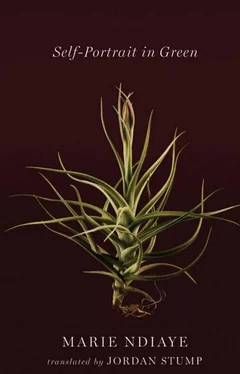The day I leave, I give her a green silk scarf. She immediately drapes it over her head, then changes her mind and wraps it oddly around her hips. I tell her about my children.
“Ah,” she says, deliberately cutting me off, “aren’t children the salt and pepper of our dull little lives?”
* * *
My mother is a woman in green, untouchable, disappointing, infinitely mutable, very cold, able, by force of will, to become very beautiful, and able, too, not to want to. Where are they now, my mother, Rocco, and Bella? I won’t write them and they won’t write me, until one day, perhaps, a letter might appear from some unknown place, accompanied by photos of unknown people who will happen to be my family, to various degrees — a letter whose authenticity, even if it’s signed “Maman,” I will dispute, and which I will then stuff away in some spot where it will never be unearthed again.
* * *
December 2003 — The floodwaters now surround Katia Depetiteville’s house. She’s in no danger, but, isolated to a degree difficult to bear even for someone who lives in such solitude, she asks us on the phone to put her up for a while.
Jean-Yves hoists the rowboat onto the roof of the car, drives till the road disappears into the water, parks the car, takes the rowboat down from the roof, puts it in the water, and climbs in. The water has almost reached the threshold of Katia’s house. Katia is waiting on the second floor, on her balcony, with a little pack on her back. Jean-Yves tells me all this later, staring at something invisible in the gray mist. With one single oar, he gently brought the rowboat under Katia’s balcony, and then Katia straddled the balustrade and, without warning, threw herself off.
“Fortunately she landed in the rowboat,” says Jean-Yves, “but she almost capsized us, and in any case, what was she trying to prove with an idiotic stunt like that?”
An absolute woman in green, Katia Depetiteville never shows any trace of gratitude for a favor that’s been done her. Comfortably settled in with us, she exercises her rights as a houseguest with a voracity, almost a brutality, that I never see when I stop by her place for a cup of coffee, when the monotony of her life and the dreariness of her house so weigh on her that a gentle numbness is all she’s capable of. Now she’s come back to life, she speaks out, butts in with her opinions, lets herself be served and coddled. One day, she pulls on her green wool pants and her bottle-green sweater and she and I set off for Bordeaux to catch the Paris train and pay a call on my two sisters, whose existence I suddenly recalled as I was reading a biography of the Papin sisters, and that memory of their obscure presence somewhere in the suburbs filled me with anxiety and contrition, making me think that although I could live perfectly well without seeing or thinking of them, it might perhaps be different for those two, who, apart from my now-exiled mother and indifferent father, have no other close relative than me. I scolded myself for rashly dismissing certain rumors concerning their dependence on alcohol and some sort of drug, respectively. And so I overcome my reticence, my repugnance for anything to do with my family. I fortify my resolve with Katia’s company, Katia who’s perfectly thrilled to be getting away from the Gironde, assuring me she hasn’t been out of the region for a good twenty years, which I find doubtful, without saying so. I never point out Katia Depetiteville’s flagrant inconsistencies to her face.
I struggle to remember the way to the building where, as the younger one told me this morning on the phone, my two sisters still live. Close beside me, Katia is gloomy and quiet — was she hoping for something a little more fun? Hoping this visit to the two girls was only a pretext for, once we reached Paris, going out on the town, seeing people? I don’t know. I don’t understand her. I really do not understand this Katia. But time has gone by, and my sisters look nothing like the girls they once were. Now they’re two very heavy, very bulky women, who greet us with none of the awkwardness and timidity I recall from before. Their faces are pleasant, jovial, their eyes bright. Their beautiful black hair curls identically over their two pairs of shoulders. They’re dressed in athletic wear of a fashionable style and brand, though it’s entirely clear that neither of them practices any sport. Even I am surprised by the joy I feel on seeing them again. I embrace them one after the other, and under my fingers I can feel their bra straps digging into the abundant flesh on their backs. And then, from her sullen air, I deduce that Katia is disappointed by my very round, very substantial sisters, that she’s already banished any impulse of sympathy or respect for them from her mind. She stands with her back pressed to the door, her arms crossed over her green sweater, her mouth disdainful, her green eyes motionless, distant. Angry, I whisper to her:
“No one’s forcing you to stay, you know.”
Forever a woman in green in my memory, Katia Depetiteville opens the door behind her and backs out of the room with a wan smile on her lips. I never saw her again. I never heard anyone mention her again. Oh, she’ll be back — but in what form? She’ll be back — how can I know that?
* * *
My sisters have settled down now, their lives are almost established. The first one shows me a photograph of a young man with a brutish forehead: she’ll be marrying him in a few weeks. Both of my sisters work, together, in some sort of government office.They inspire confidence, they’re at peace — why is all of this nevertheless so sad? It’s nothing more than life at its most ordinary — why is this all so sad? A wicked thought comes to me as I sip my tasteless tea, bored, in their little kitchen: it wasn’t worth losing Katia Depetiteville just to come pay this charitable call on my sisters. Because I think of my mother, of Ivan’s wife, of my stepmother, and I fear I’ll see myself as a senseless fool should all those women in green disappear one by one, leaving me powerless to prove their existence, my own originality. I then wonder, in my sisters’ tidy kitchen, how to find bearable a life without women in green exhibiting their slippery silhouettes in the background. In order to slip serenely through these moments of stupor, of deep boredom, of crippling inertia, I need to remember they decorate my thoughts, my invisible life, I need to remember they’re there, at once real beings and literary figures, without which, it seems to me, the harshness of existence scours skin and flesh down to the bone.
“Did you go see Maman?” my younger sister asks, with that naive and unwavering kindliness I always find so moving.
“Did you go see Maman?” asks my other sister, more severely.
I tell them I saw our mother in Marseille, but they shake their heads with a “tttss,” tell me they won’t hear another word about that, and inform me that our mother is now once again living in this same building, on another floor, alone. She was lucky enough to get her old job back, in the neighborhood school.
Disoriented, I ask:
“What about Bella? Where’s her little girl?”
My sisters lower their eyelids, fringed with long, thick lashes. They hide their eyes, but I can see the inflexible creases of their mouths.
I stand up, mumble “Goodbye,” and hurry out. An artificial scent of honeysuckle hangs in the air of their apartment, and my head is swimming. I’d seen more than one can of that freshener in every room, and three or four times in the course of my stay I saw one or the other of my sisters go and reflexively press the button to fill the air with perfume.
I start downstairs, gripping the banister. I reach the landing on my mother’s floor and go to her door, pressing one ear against it, and from the other side I hear the regular sound of deep breathing, as if my mother were sitting on a chair with her own ear glued to the door, waiting, inert, perhaps lulled to sleep by the rhythm of her own breathing, so heavy, so masculine. I feel anger and pity. A little later, as I was nearing the ground floor, I thought my mother’s door had swung open. Maybe she saw me, maybe she called out to me — maybe not.
Читать дальше












